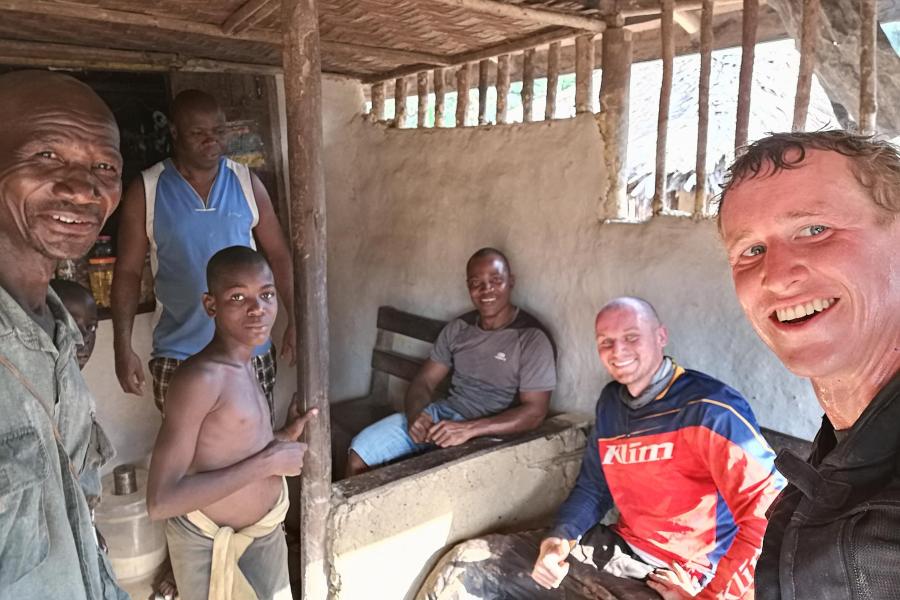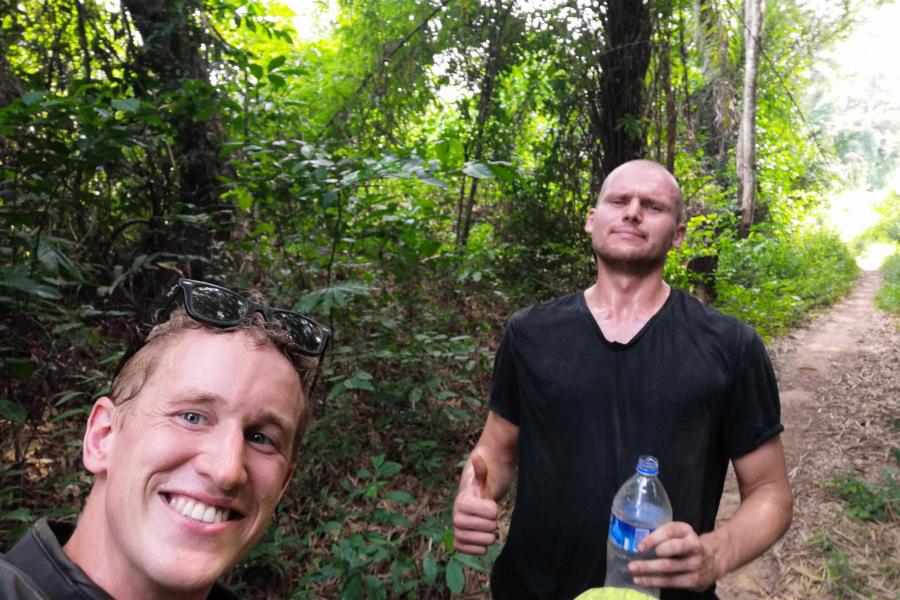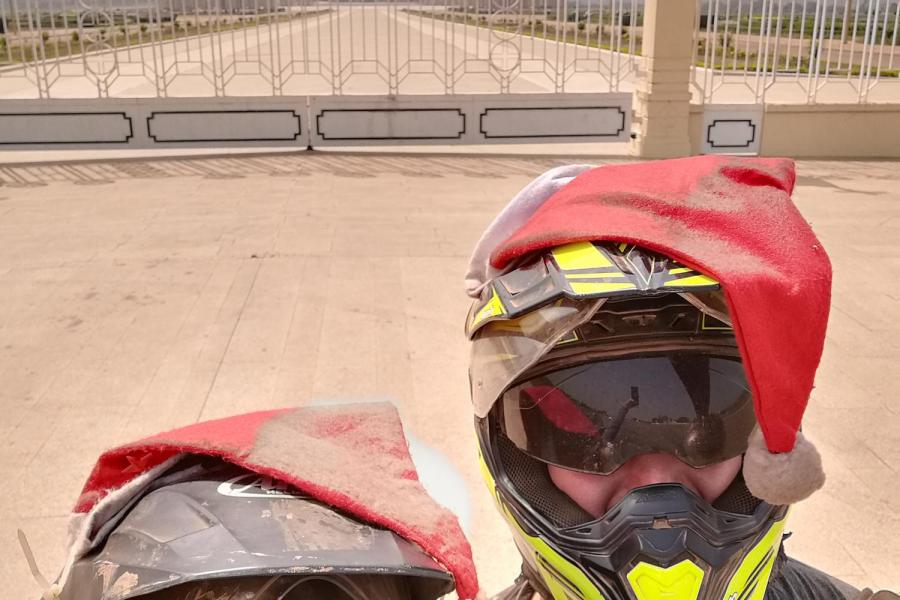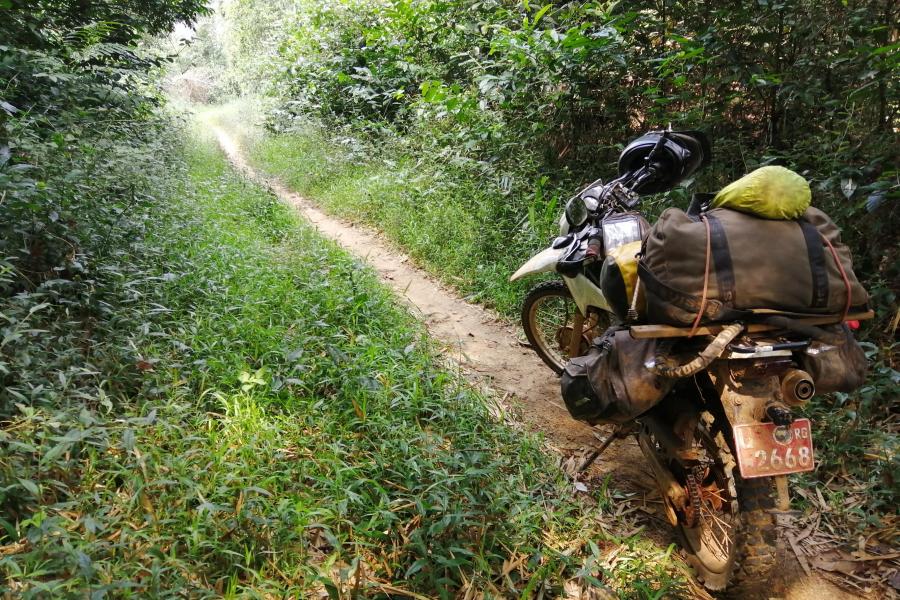Monrovia - Buchanan - Tapita City - Toutlepleu - Yamassoukrou - Abidjan
Country
Joyeux Noel everyone!
I hope you’re all enjoying the holidays :) My Christmas this year is a bit different - but all is well and I’m enjoying the warm Ivory Coast. I’ve been celebrating with some offroading in the Liberian jungle as you do. Here’s what happened over the last two weeks.
Max and I left Monrovia on the 16. December 2019 and headed South towards Buchanan. We stopped by the city and had some lunch but decided not to stay overnight. We continued North, first on the unpaved main (!) road and then through the Firestone Kautschuk plantation (the biggest plantation in the world) and on through palm oil plantation number 3 (that’s what it’s called). Towards 3 pm we had made it out of the cultivated lands and into the beginnings of the jungle. The roads started getting narrower and muddier (despite the dry season). Max and I learned rule number one of jungle riding the hard way: always go through the middle of the puddle (not the sides). We both got stuck one or twice and at around 4 pm decided to call it a day and set up camp in the next village.
It had been a while since our last village camping and it was nice to be back out in the real Africa. We knew the drill: make friends with the chief, set up our tents under surveillance of the kids, get water from the well, take a bucket shower, cook sardines and pasta, go to bed at 9 pm, get up at 6:30 am, make Nescafe, pack our stuff and say goodbye to the villagers. We rode for about 20 minutes when two things happened: I noticed that I had lost the spring of my bike stand (meaning that I couldn’t get off my bike anymore, without leaning it against a tree or Max) and Max noticed that the Nimbo river in front of us was to deep to cross (meaning that we would have to turn around). Oh well, that’s what happens when you just follow the GPS (in our defence, the village people hadn’t known either). We backtracked through the village and a bit back through plantation number 3 and found a bridge to cross the river. We continued along the unpaved (main!) road and got along nicely until the junction after Radio village (that’s what it’s called).
At this point we decided to take the road less travelled by. We refuelled, bought water and Mr. Sharif a very friendly roadside mechanic - even fixed me up with a new spring, so Max didn’t have to hold my bike every pee stop ;) Instead of going 350 km around on the main road (which wasn’t in great shape anyway) we decided to take the jungle shortcut of 170 km to Tapita City. According to the GPS - there would be no more impassable rivers so we decided to risk it :). High fives, good luck, thumbs up - and we were cruising along nicely in the late afternoon lighting through the lush Liberian brush on a very good gravel road. We knew to enjoy our luck while it lasted, as the road couldn’t possibly continue this splendidly. It was about 5 pm when in this rider’s bliss - my chain jumped off on a steep hill when I hit a pothole. Now my suspension had been broken since the beginning in Conakry and I knew I had to do something about this. Luckily Max was behind me when it happened and knew how to bogger fix. He told me not to keep reving, and I got to perform a roadside repair under his supervision. Max informed me of my luck, as the chain could well hit the engine and poke a hole in it. All in all, it took me an hour to unjam the chain, get it back on and tighten it up properly. It was 6 pm and we decided to hit the next village for a shower instead of wild camping. We just made it to Chief Koitu’s assembly of huts as the sun went down. We had a very relaxed village camp that night. We weren’t as exposed as we usually were and had some nice conversations with the men and got a good night’s sleep. The shower turned out to be in a nearby stream, as our hosts did not have a well. It was splendidly refreshing. There was a round of laughs as Max and three locals watched me wash, waiting for me to finish. Max is faster than me at basically everything: getting up, packing up, riding, setting up, cooking, washing and going to bed. The situation was a perfect depiction of our daily experiences :) Max still hasn’t gotten around to stopping the time he waits for me every day - I’m pretty sure he’d save about an hour on average XD.
The next day, 18. December 2019 turned out to be as intense as they come. We got an early start as we were still about 140 km away from Tapita City (which according to Chief Koitu is just like Monrovia). We figured we could make it in a day of riding. Everything went fairly smooth until about 30 km outside of Tapita, when the gravel road ended at a village on the side of a river. Now on google maps neither the river nor the broken bridge are visible. The locals said we could push the bike over the broken bridge (we politely declined - see the picture below for reference). Instead we tested the depth of the river and decided that it was just doable for a single rider without luggage. Well maybe for an experienced single rider. I went first, and Diddy died on me midstream (only photos, no videos - so as not to disappoint my fans ;). The support crew of friendly villagers pushed me out though - no problem. Max the man made it through. I feel no shame.
After repacking and a short break, we commenced on what would be the hardest leg of trek. The trail was first a lovely single trail through the brush.
It however was soon spiced with obstacles like a Nintendo game and Max and I started on a parcours of narrow plank bridges, muddy pathways, dried up muddy pathways and puddles. We thought we were basically in town and the roads would get better the closer we got to Tapita. This was incorrect. I actually got the feeling of reaching my personal physical limit in that hot afternoon sun.
That being said, we did make it into Tapita City by 5 pm and devoured our rice with sauce (we hadn’t eaten all day) and decided to rest up the next day. Well deserved I’d say. We stayed at one of the only two guest houses in town for USD 15 a pop for a double room, no shower, no wifi. Tapita City didn’t quite turn out to be like Monrovia. We enjoyed the down time though and washed our clothes, took a shower and chilled a bit. We made friends with the guards and one of them told us about fighting in the civil war. He was drafted right out of high school to fight the rebels for 14 years. In 2003 when the war ended he had the first of four children with his girlfriend in Robertsport. Many Liberians we have met have children but aren’t married for cost reasons. This despite there being an evangelical church on every street corner (some we’ve been told, run by ex warlords - yup). The guard (I’ve forgotten his name) has been working at the guesthouse 500 km away from his family for a couple of months now. Max and I were both struck by his story. The next night, when the boss wasn’t around, the guys got absolutely hammered and were a bit of nuisance to be around. When we left they asked us for money. We declined and were on our way. You definitely see traces of the war in the Liberians. We have experienced the people to generally be very friendly though and keen to get on with their lives and the future of the country.
After two nights in Tapita City, we headed out toward the Ivory Coast border on the 20. December 2019 bright eyed and bushy tailed. It was 50 km to the border and I thought it would be easy riding. Although not jungle bad - the road turned out to be pretty darn bad. I took one last fall (in my freshly washed clothes) in the Liberian mud (see the picture below - Merry Christmas :). We crossed into the Ivory Coast okay though and were happy again when greeted by the (not quite ivory) tarmac, fish and beer in Toutlepleu.
There had been no customs officer on duty at the border to register our bikes and we had been sent into town. The officers in town said we had to trek up to the city of Man. So we started along and I had a bit of a moment when the tarmac turned back to gravel and Man was still 160 km away. It isn’t my style to ask officials for extra hurdles and I figured we should have just continued to Abidjan. But the officers in Toutlepleu were so friendly (the police here are great - no corruption so far) and even escorted us the first bit of the way that we couldn’t take another route. We had a village camp along the way and found the customs office in Man the next day. The road also turned back to Tarmac, so all was well. The customs officer in Man told us we had to go to Abidjan (the biggest city in the country) to register the bikes (wow). So we headed on South and at around 4 pm set up camp in Douekou next to a little pond. I negotiated our stay with the owner of the nearby restaurant via his staff’s phone and we enjoyed some chicken and fries under an Ivory Coast sunset (they’re epic). Turns out the boss on the phone is a minister and lives in France (hmm) - good thing I was polite :) The next day we continued on to Yamassoukrou. All was going well - paved streets (albeit with some construction and potholes) and enough omelette bars along the way. Then my clutch failed 120 km away from Yamassoukrou. DK wasn’t in great shape to begin with and the jungle riding took its toll. I knew I was riding on my last kilometres but really hoped I could make it to Abidjan for some serious maintenance, as there would be professional mechanics there (hopefully). I guess I couldn’t let Max off, without one last bike problem (sorry Max!). I took Max’s bike (which never seems to have any trouble btw) into the next town of Bonbon. I found a mechanic with a tricycle pick up, went back to find Max and DK, lifted DK to the village and put in a new clutch using African bush techniques (aw the power of the hammer!). I did feel lucky though that we got it all sorted in a reasonable amount of time. Even though we knew we couldn’t quite make it before dark, we decided to gun it to Yamassoukrou 100 km away. For once, the roads turned in our favour and we made it into the capital a little after nightfall. We found a pleasant little hotel, the owner of which took some convincing to let two men stay in a double room (Max and I are cousins for the record) and enjoyed running water, wifi and (wait for it) air-conditioning for the first time since Dakar I think :). After the clutch incident we were pondering on whether or not to give DK a full on overhaul in Yamoussoukro instead of Abidjan. We soon discovered that it would be better to head on South to Abidjan as Yamassoukro really isn’t much of a city but more like the home village of a former president declared the capital and pimped with a gigantic basilica (estimated costs at USD 400 mio., the size of the Peters dome in Rome and about 70 people attending mass on Sunday) and huge boulevards all around town.
The road from Yamassoukro to Abidjan was 270 km of absolutely perfect tarmac and no traffic. Splendidly boring for my warn Diddy. It was a bit surreal as it felt like a French highway built in the middle of Westafrica. It wasn’t really being used though. The exits quickly turn to good old red African gravel once you're off the highway. A bit of a farce, but I was grateful.
We rolled into Abidjan on the 24. December 2019 in the afternoon and were glad to have made it here in one piece in time for Christmas. We’re staying at the elephant’s nest. A guest house run by Chloe from Ireland who has been in the Ivory Coast for 13 years and is very well connected. This is a bit of an overlander’s hub and it is nice to spend the holiday season with other travellers. Very good vibes here. Max and I splurged on some fish for our Christmas dinner. On Christmas day, Chloe decked out a buffet for all the guests and now we’re all puttering about the place until new years. Max and I have basically taken DK apart (thanks Max!) and are spending the days finding parts, doing maintenance and getting the next visas.
Merry Christmas and a happy new year to one and all
Chris




